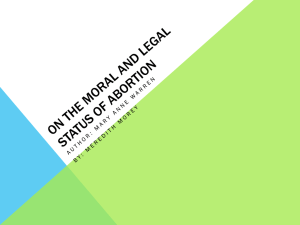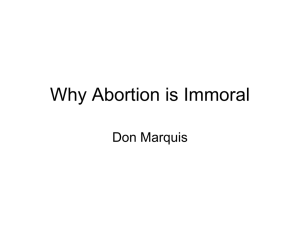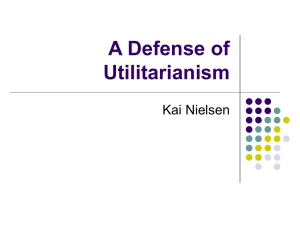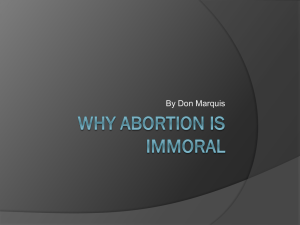Lect12-Abortion
advertisement
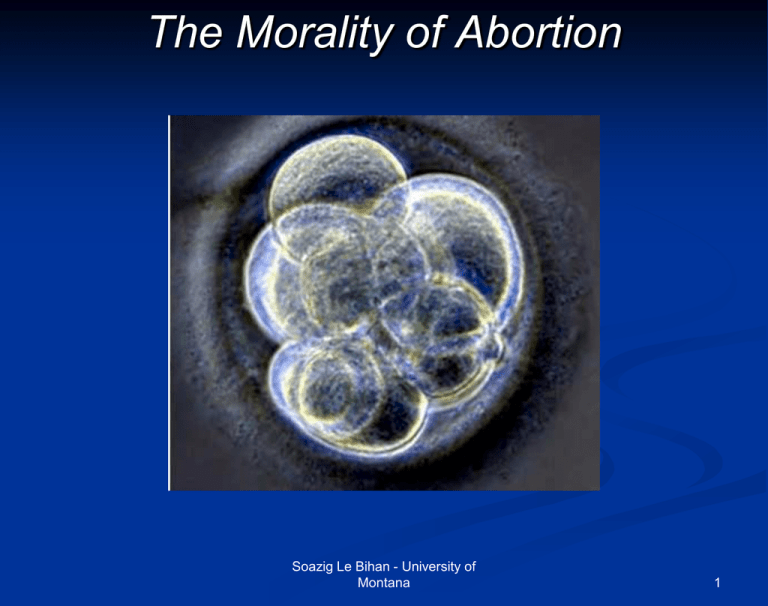
The Morality of Abortion Soazig Le Bihan - University of Montana 1 Outline Introduction: What this chapter is about The Person Argument The question of Personhood Marquis: An alternative to the person argument Thomson: Is it always wrong to kill an innocent? Conclusion 2 Introduction: What is at stake? What this chapter is about Deepening our understanding of the arguments on both sides Two opposite values The fetus’ ``right to life” The mother’s ``right over her own body” 3 Outline Introduction: What this chapter is about The Person Argument The question of Personhood Marquis: An alternative to the person argument Thomson: Is it always wrong to kill an innocent? Conclusion 4 The Person Argument The Person Argument: An important distinction P1: The fetus is an innocent person P2: It is wrong to kill an innocent person CC: It is wrong to kill a fetus The argument is valid: is it sound? P1: what is a person? P2: is it always true? 5 Outline Introduction: What this chapter is about The Person Argument The question of Personhood Marquis: An alternative to the person argument Thomson: Is it always wrong to kill an innocent? Conclusion 6 The question of Personhood The Problem The question of personhood is crucial: To assess the argument, we need: - Either sufficient conditions that the fetus satisfies - Or necessary conditions that the fetus does not satisfy What makes a person a person? Persons are what we don’t kill lightly -Class survey: what is ok to kill? -The alien thought experiment Is there any satisfactory criteria? 7 The question of Personhood Discussion Criteria often given by the opponents: 1. Being alive 2. Human shape 3. Human DNA Problem: 1. All animals 2. Robots 3. Any human cell TOO BROAD Criteria often given by the defendants: 1. Intelligence 2. Communication skills 3. Moral agent Problem: Mentally handicapped and insane people TOO NARROW 8 The question of Personhood Conclusion The question of personhood: Dead end? A proposal: Sentience as a necessary and sufficient conditions for not killing lightly The absurdities are thus avoided Consequences: -Animals -Fetus after 20th week Another option is to avoid the question of Personhood altogether: Marquis and Thomson 9 Outline Introduction: What this chapter is about The Person Argument The question of Personhood Marquis: An alternative to the person argument Thomson: Is it always wrong to kill an innocent? Conclusion 10 Beyond the question of personhood Marquis: A future like ours The question of wrongful killing: criteria? - Against desire? - Interruption of valuable experience? Marquis’ proposal: An instance of killing is wrong when it deprives someone of a valuable future like ours. general explanation of why we think it is wrong to kill Consequences: -VAS ok -Wrong to kill humans, animals, and fetuses Marquis: abortion is wrong because it deprives the fetus of a valuable future like ours 11 Beyond the question of personhood Steinbock: Objections against Marquis What does it take to have a future?: Personal identity, that is, a way to link the individual now to the future Two theories of personal identity: 1.Physical Theory of identity (Phys-TI) 2.Psychological Theory of identity (Psy-TI) Dilemma: -If Phys-TI, absurdity -If Psy-TI, then sentience is necessary As in the case of the Person Argument, it seems that there is no wrongful killing without sentience 12 Outline Introduction: What this chapter is about The Person Argument The question of Personhood Marquis: An alternative to the person argument Thomson: Is it always wrong to kill an innocent? Conclusion 13 Thomson and The Violinist Deals with Premise 2 of the Person Argument: Is it always wrong to kill an innocent person? Thomson’s analogy: hooked up on a violinist without consent Thomson’s analogy: In which cases would you think it is ok to unhook yourself? Thomson’s point: the answer is not obvious We have to distinguish between cases 14 Thomson’s Analogy: Assessment In which cases does the analogy work – Warren? -Rape -Mother’s health endangered What about the other cases? – failure of birth control Jane English: performance and reception These are analogies: can we find a rational basis for the argument? 15 An Important Distinction: Moral Obligations vs. Moral Favor Thomson’s main thesis: We are not morally obligated to help another in such circumstances, but it will be a great moral favor Moral Obligation Something that one must do on pain of immorality BLAME if not done Ex: keep your promise Moral Favor Something that one can do above moral obligations PRAISE if done Ex: Britney Spears’ Touch and the Good Samaritan Keeping the child in case of unwanted pregnancies is a moral favor, not a moral obligation 16 Thomson: Conclusion Thomson’s main thesis on abortion: A continuum of cases, ranking from clear cases of great moral favors and moral indecency Moral Indecency Good Samaritan Moral favor Moral Obligation Sacrifice Beware of the slippery slope ! 17 Outline Introduction: What this chapter is about The Person Argument The question of Personhood Marquis: An alternative to the person argument Thomson: Is it always wrong to kill an innocent? Conclusion 18 The Morality of Abortion Conclusion A central notion for wrongful killing: sentience An important distinction for assessing our actions Moral favors vs. Moral Obligation An important lesson for abortion: No straightforward answer but continuum of cases: - Clear cases in which abortion is wrong - Clear cases in which abortion is right - Continuum of cases in the middle 19
